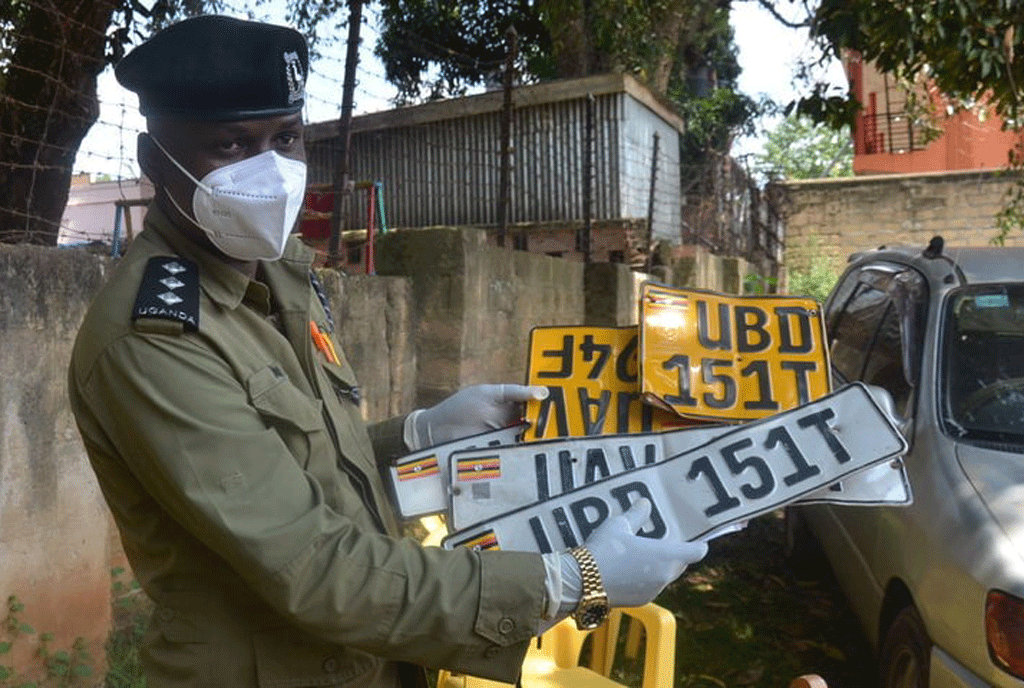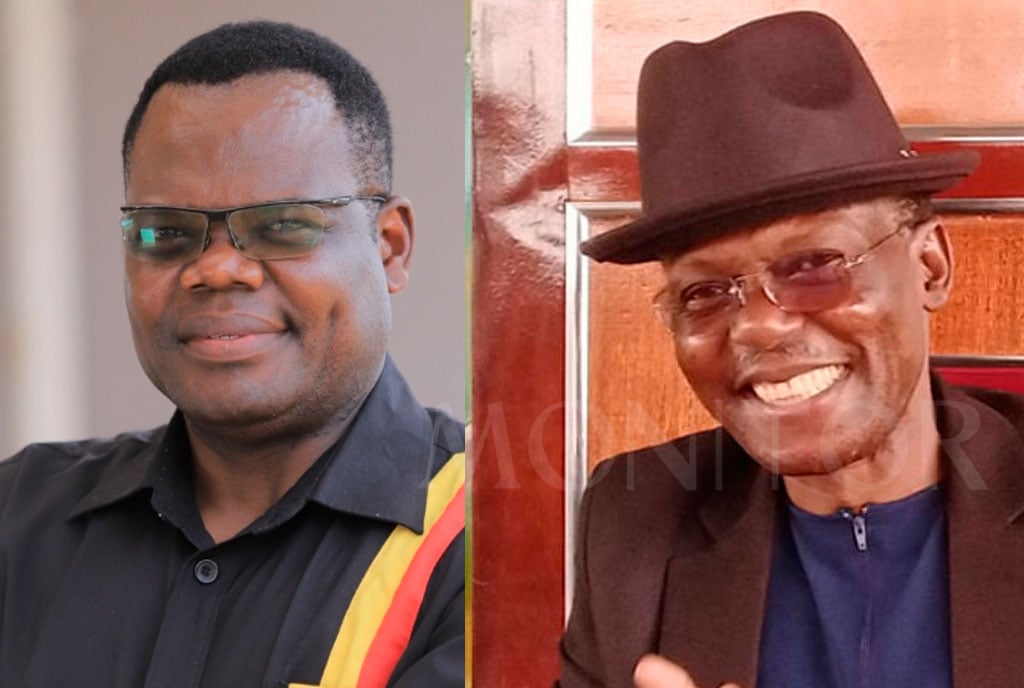Prime
Car tracking deal runs into trouble

Kiira Region Police Spokesperson James Mubi displayes some stolen number plates in Jinja City last year. Government’s plan to digitalise car number plates has raised many questions after Ugandan officials who travelled to Moscow on a benchmarking trip were underwhelmed by the capacity of the contract firm. PHOTO/FILE
What you need to know:
- Russian Roulette: Although described as bullish in interactions with government officials, a visit to the company’s Russian operation left Ugandan officials underwhelmed and sceptical.
Concerns are growing within different government agencies about the capacity of a Russian firm that was awarded a multi-million-dollar security contract to install new vehicle number plates that can be tracked.
The government, represented by the Ministry of Security and the Ministry of Works and Transport, entered into an agreement with Joint Stock Company Global Security (JSCGS) , the Russian firm, on July 23, 2021.
Under the 10-year agreement, JSCGS was to set up an Intelligent Transport Monitoring System (ITMS) to allow law enforcement agencies to detect, prevent and solve crimes committed with the use of motor vehicles and motorcycles.
However, with only six weeks to July 1 when the new system is supposed to be rolled out, there are widespread fears about the company’s ability to start on time – and deliver on what is widely seen as President Museveni’s flagship security project.
Under the project, all new vehicles registered in Uganda from July 1 should receive new “digital” number plates with an embedded chip that can be read, identified and tracked by CCTV cameras. Each car is also supposed to be installed with a tracking device that law enforcement agencies can use to track traffic offenders and other criminals.
However, a team of Ugandan officials who travelled to Moscow in March on a benchmarking trip were unable to see any of the new vehicle number plates, our investigations reveal, because none was available.
“The team was not able to inspect a complete registration plate sample fully installed with chip and affixed with hologram as per the specifications,” a report from the benchmarking exercise noted.
“This was due to the fact that the Ugandan registration plate manufacturing was being undertaken in Poland due to the sanctions placed on Russia by other EU countries.”
JSCGS promised to deliver 50,000 digital registration number plates to the country by June 1, 2023.
However, with just two weeks to that milestone, none of the 50,000 registration plates have been seen, inspected, verified, or imported into the country.
A proposed trip to Poland to pre-inspect the registration plates has also not taken place, despite officials warning about the need to undertake “a holistic assessment of the readiness to commence implementation of the ITMS project by July 1, 2023, as scheduled, including tasking JSCGS to provide a complete delivery schedule of the equipment required for the project”.
Delays in the delivery of the plates could leave motorists unable to register their new vehicles, undermining government revenue collection. In addition, the delivery and installation of untested and unverified motor vehicle registration plates could lead to substandard or defective plates which do not work as required, or can easily be tampered with.
Flying blind?
The team that travelled to Moscow was meant to see, first-hand, the kind of system that the Russian company set up in Moscow and intends to set up in Uganda. However, officials on the trip found that Russia does not use digital registration plates that JSCGS intends to deploy in Uganda, but instead uses an Automatic Number Plate Recognition (ANPR) system, which is the standard in most countries.
“Russia uses ANPR cameras to read registration plates on the road,” the benchmarking report noted.
“The ANPR complex has the capability to capture the vehicle number plate, analyse the data, relate it to the registered vehicle owner and locate the motor vehicle in real time.”
The ANPR system in Russia was set up by the government and there is no proof that JSCGS played any role in setting it up. The benchmarking report does not show that the Russian company has installed the system it intends to set up in Uganda anywhere in the world.
An ANPR system can read existing motor vehicle registration number plates, without requiring motor vehicle owners to pay for new digital plates. The officials noted, however, that this would require the expansion of the CCTV camera infrastructure.
“Non-digital registration plates can be used to track offenders if complemented with a close/high camera density and covering all parts of the country. In the absence of such high camera density in Uganda, a digital registration plate system coupled with installed trackers would achieve the same objective,” they noted.
The benchmarking report concluded with a red flag: “On the basis of the established findings of the benchmarking/pre-shipment exercise, there is need for the PMT to undertake a comprehensive assessment of readiness to implement the project by July 1, 2023, putting into consideration all tasks that need to be implemented prior to commencement including training and public awareness.”
Despite the concerns, few government officials are willing to speak about the project or query the capacity of the Russian firm for fear of losing their jobs.
“Those people are untouchable,” a very senior government official familiar with the project told this newspaper. The official insisted that they could not be identified by name or even rank. “Whenever the technocrats raise queries, they threaten to report to the President, so no one is willing to point out that things are not going the way they are supposed to, because they will get into trouble.”
With just six weeks to the start of the project, the Russian firm is yet to recruit the hundreds of Ugandans expected to work on the project. It is also not clear where the tracking gadgets and the digital registration number plates will be installed, since no facilities are known to have been set up for this purpose.
In addition, the different procedures for getting the new motor vehicle number plates and trackers, and the relevant fees involved, have not yet been communicated to the public.
Attempts to speak to JSCGS were futile. We were unable to find the company’s office in Kampala, or a contact for the company in the country.
Security Minister Jim Muhwezi, State Minister for Transport Fred Byabakama and the Works and Transport Ministry spokesperson Susan Kataike did not answer our calls.
This is not the first-time questions have been raised about the ITMS project, which was awarded to the Russian company by presidential directive rather than open competitive bidding.
Contract queries
In February and March 2022, Parliament’s Committee on Defence and Internal Affairs raised several questions about the contract, its financing and clarity about who, between the Works and Security ministries, had ultimate responsibility for its supervision.
MPs also raised questions about the selection of the firm, with Tororo District Woman MP Sarah Opendi questioning the quality of due diligence done on the firm before it was awarded the contract.
But the classified nature of the project under security has shielded it from wider scrutiny, including from government officials meant to oversee its successful implementation. (See tinted story on what was claimed last year, and what has transpired more than a year on – Editor).
Under the terms of the contract signed with the government, JSCGS is supposed to cover the costs of setting up the project – estimated at more than $250 million – then recover its money, plus a markup, through traffic fines and the cost of new motor vehicle registration plates, over 10 years.
However, with the government required to cover any shortfalls in the company’s revenue projections, the financial cost of any poor planning or defective installations will eventually be met by the taxpayer.
Promises of Russian firm
Security Minister Maj Gen (rtd) Jim Katugutu Muhwezi and his Works and Transport counterpart, Gen Edward Katumba Wamala appeared before the Parliamentary Committee on Defence and Internal Affairs in March 2022 to defend the selection of Joint Stock Global Security Company (JSGSC) and its capabilities. Here below, we break down some of the claims made then and the reality more than a year later.
Claim: In an appearance before Parliament, Mr Noah Baalessanvu, an official who claimed to have been part of the team that did due diligence on JSGSC, said the firm would manufacture the digital registration plates and tracking devices within Uganda.
Reality: There is no factory to manufacture the plates or the tracking devices in the country, and no plans have been announced to build one. The company says the digital registration plates are being manufactured in Poland due to sanctions against Russia, but no Ugandan official has seen them or tested them against specifications. Ugandan officials did not see a digital registration plate manufacturing plant in Russia, or similar plates the company might have manufactured for other countries/clients.
Claim: Mr Baalessanvu told MPs that they had visited the Russian company, talked to clients in countries that had bought services from the firm, and established that the firm was competent. “To the satisfaction of the team that went there, the company had demonstrated that they had both the technological capacity and the manufacturing capacity to undertake this project,” he said.
Reality: A government benchmarking team that visited Russia saw a different system (ANPR) in operation. They were unable to see the digital registration plates meant for Uganda and there is no evidence that they spoke to clients or countries that have set up the kind of Intelligent Transport Monitoring System (ITMS) that the company intends to install in Uganda.




